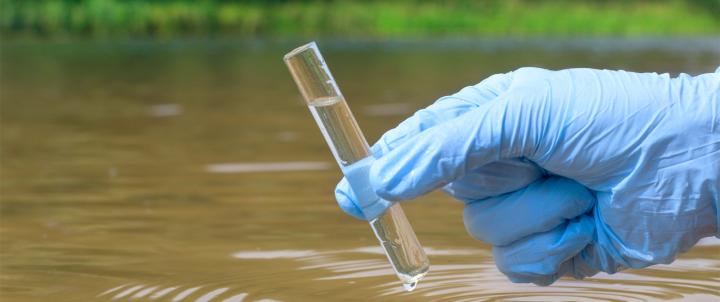
About this Program
Students in Hood's environmental biology master's program seek to understand and address pressing environmental issues. They envision finding ways to alter the course of climate change, the effects of invasive species and unsustainable uses of natural resources. They have a compelling desire to transform the future through leadership, education and example. For them, keeping the air, water, land and its resources clean and sustainable is more than a career path. It’s a passion.
Program Overview
Tuition & Fees
Funding Opportunities
Hood’s Master of Science in Environmental Biology provides a strong foundation in ecology, pollution biology, resource management and biostatistics. The program, with its subsequent wide array of electives and specialized research opportunities, provides excellent preparation for environmental professionals and educators who seek to update their knowledge and skill sets, as well as for individuals interested in obtaining the essential background knowledge necessary to transition into an environmental career.
Our Mission
The environmental biology (ENV) program strives to educate students in processes that keep our air, water, land and their respective resources clean and sustainable. ENV students become well-versed in the latest research and methods to understand and address the most pressing environmental issues, with an emphasis on climate change. Our program values close partnerships between students and faculty by maintaining moderate enrollment and a low student-to-faculty ratio.
Our program’s ultimate goal is to have graduates emerge with the expertise in environmental biology that will enable them to assume key positions in the public and private sectors charged with protecting our environmental future.
Program Learning Goals
Upon graduation from the environmental biology master’s program, our students will be able to:
- Problem solve and apply the scientific method to the field and literature of environmental biology.
- Collect, analyze, interpret and display scientific data using appropriate, current methods and software.
- Effectively communicate scientific information to diverse audiences through writing and oral presentation.
- Demonstrate a broad knowledge of environmental biology and ecology.
Real-World Connection
The ENV program’s curriculum bridges the sciences to real-world socioeconomics and politics. Multiple research and non-research tracks permit students to customize a path that is best-suited for their career needs and goals. Learning key techniques, such as remote sensing, GIS, and field identification and sampling, opens new windows to understanding and protecting natural resources.
Flexible Schedule from the Lab to the Field
The Master of Science in Environmental Biology is the only part-time graduate program in the region that emphasizes a field and laboratory approach to learning and promotes hands-on research opportunities. Hood’s ENV program is ideal for working professionals who want to take their commitment and their careers to the next level. Hands-on experiences and small class sizes keep instruction focused and learning interactive. Evening classes with some weekend and hybrid offerings, along with summer sessions, fit busy lives.
Students enrolled in the environmental biology M.S. program have the option of earning a GIS certificate with the completion of nine core credits and nine elective credits of GIS courses.
View March 2021 recorded virtual lecture given by entomologist Dr. Doug Tallamy. He discusses simple steps that each of us can and must take to reverse declining biodiversity. He explains why we ourselves are nature’s best hope.
Degrees Offered
- MS
Department Offering
Related Graduate Programs
Are you ready to go further?
Program Requirements and Course Listings
Admission Requirements
Applicants with an undergraduate GPA of 3.0 or higher are preferred. At minimum, all applications must have completed and earned a B or better in the following:
- Two college-level biology courses (with lab)
- Two college-level chemistry courses (with lab)
- One college-level math course (e.g., statistics, algebra, pre-calculus, calculus)
To apply to the environmental biology master's program, please:
- Complete and submit the online application, including an essay of 550 words or less describing background experience and future goals.
- Request an official transcript be submitted by each institution attended
Applicants who have an undergraduate GPA below 3.0, must also submit the following:
- Two letters of recommendation. Letters can be emailed to gofurther@hood.edu.
Priority Application Deadlines:
- December 1: Spring semester application deadline
- May 20: Summer I session application deadline
- June 30: Summer II session application deadline
- August 15: Fall semester application deadline
Transfer credit policy for admitted students
Students may transfer a maximum of 6 graduate credits from an external, accredited institution, or another Hood graduate program prior to the first semester of study in the current program. Please review the full graduate transfer credit policy in the College catalog.
The program has two tracks, a research and non-research track—both require the completion of 33 credits. The research track includes either a 6-credit thesis (invitation only) or a 3-credit independent research project. The non-research track includes either a 3-credit internship at an approved agency or an intensive capstone course as the final programmatic experience. Both tracks are designed for students from a variety of academic backgrounds.
A required core of courses provides students with a comprehensive background in all aspects of environmental biology. Students will be able to place environmental issues into a broad social, political and economic context; however, the primary core course emphasis will be on using environmental biology principles to identify and solve environmental problems.
The elective courses provide each student with the opportunity to tailor their program to meet particular professional needs. Some electives are clearly rooted in natural science and mathematics. These are the ones most students will choose in order to further their careers in environmental research, regulation, consulting and teaching. Other electives come from the social and political sciences and are well-suited for students planning to enter the realm of public policy. There are also 1-credit elective offerings that stress laboratory and field techniques. Three of these 1-credit courses may be taken in lieu of one 3-credit elective for thesis students. All other students (project option or non-research track) must complete three of the 1-credit courses as part of their 33 credit minimum.
All students must complete the following:
| ENV 501 | Introduction to Environmental Biology | 3.0 |
| ENV 502 | Principles of Ecology | 3.0 |
| ENV 503/ENSP 403 | Pollution Biology | 3.0 |
| ENV 505 | Biostatistics | 3.0 |
| ENV 507/ENSP 407 | Natural Resource Management | 3.0 |
All students must complete one of the following (3 credits each):
| ENV 511 | Conservation Biology | 3.0 |
| ENV 512 | Insect Ecology | 3.0 |
| ENV 513 | Marine Ecology | 3.0 |
| ENV 551/BIOL 451 | Plant Ecology | 3.0 |
| ENV 563 | Freshwater Ecology | 3.0 |
Elective Courses
Electives include, but are not limited to, the following:
| BMS 537/BIOL 437 | Introduction to Bioinformatics | 3.0 |
| CHEM 501/CHEM 401 | Environmental Chemistry | 3.0 |
| ECPS 514/ECPS 414 | Environmental Policy | 3.0 |
| ENV 506 | Environmental Microbiology | 3.0 |
| ENV 511/ENSP 411 | Conservation Biology | 3.0 |
| ENV 515 | Research Design & Data Analysis | 3.0 |
| ENV 516 | Watershed Hydrology | 3.0 |
| ENV 522 | Ecological Sampling | 1.0 |
| ENV 524 | Taxonomy | 1.0 |
| ENV 526 | Analytical Techniques | 1.0 |
| ENV 528 | Specialty Courses | 1.0 |
| ENV 550 | Current Topics in Environmental Biology | 3.0 |
| ENV 565 | Environmental Toxicology Laboratory | 1.0 |
| ENV 564 | Environmental Toxicology | 3.0 |
| ENV 575 | Independent Study | 1 - 3 |
| ENV 577 | Climate Change | 3.0 |
| ENV 599 | Special Topics | 6.0 |
If not taken as part of core requirements:
| ENV 512 | Insect Ecology | 3.0 |
| ENV 513 | Marine Ecology | 3.0 |
| ENV 541 | Behavioral Ecology | 3.0 |
| ENV 551/BIOL 451 | Plant Ecology | 3.0 |
| ENV 563 | Freshwater Ecology | 3.0 |
Research Track - 33 credits:
After the successful completion of 12 ENV credits, students are required to meet with their adviser to discuss the student’s remaining academic path. Once the research track is chosen, a student may not switch from this track to the non-research track.
Thesis Option:
Upon the successful completion of 12 ENV credits, ENV faculty will invite a limited number of exceptional students to complete a comprehensive thesis project. If the student accepts, they are responsible for securing a thesis adviser and committee. Thesis students must complete 6 elective credits, as well as ENV 515 and ENV 580 Thesis (6 credits), for a program total of 33 credits
Independent Project Option:
Students choosing to complete an independent project must complete ENV 515 and ENV 579 Project (3 credits), and 9 elective credits for a program total of 33 credits. Of the 9 elective credits, 3 must be designated as lab or field credits (ENV 522-528 and ENV 565).
Alternative Track - 33 credits:
After the successful completion of 12 ENV credits, students are required to meet with their adviser to discuss the student’s remaining academic path. If the alternative track is chosen, they have the flexibility to switch between the two options under this track.
Internship Option:
As part of their 33 credits, internship students will complete a 3-credit internship (ENV 591) at an approved facility through the ENV program director. Students are required to complete ENV 515 and 9 elective credits for a program total of 33 credits; 3 of 9 elective credits must be designated as lab or field credits, such as ENV 522, ENV 526, ENV 528 and ENV 565.
| ENV 591 | Internship in Environmental Biology | 3.0 |
Capstone Option:
Students, who choose the capstone option, are required to complete a program total of 33 credits, which includes 12 elective credits; three of the 12 elective credits must be designated as lab or field credits, such as ENV 522, ENV 526, ENV 528 and ENV 565.
As part of their 33 credits, capstone students must successfully complete:
| ENV 578 | Climate Change Capstone | 3.0 |
Once a student enrolls in ENV 578, they are not permitted to change options within the alternate track.
Examples of research topics
- Native insect pollinators in sustainable agriculture
- Amino acid metabolism in corals and anemones
- Restoration ecology of the regal fritillary butterfly
- The effect of atrazine on earthworm reproduction
- The effects of crayfish on headwater stream communities
- Nitrogen mineralization and phosphorus availability in composted poultry litter
- Antibiotic resistance patterns in fecal streptococcus from environmental samples
- Environmental stresses causing DNA damage and it subsequent repair in sea anemones
- An evaluation of membrane bioreactors to treatment saline wastewater in marine aquaculture
- Morphological systematics of the Crystal Darter
- Nonnative plant invasion following hurricane damage
- Chemical interactions between competing mosquito species
Please refer to the following web links:
Graduate Forms & Guidelines
https://www.hood.edu/graduate/academics/graduate-forms-guidelines
Environmental Biology Master’s Independent Research Project ENV 579/ENV 579G
ENV 579 guidelines_june2020_1.pdf
Environmental Biology Master’s Thesis ENV 580/ENV 580G
ENV 580 guidelines_june2020.pdf
Environmental Biology Master’s Internship ENV 591/ENV 591G
ENV 591 guidelines june2020_1.pdf
24 Months
30 Total Credits
| Median Salary (Public Data) | Job Titles (Alumni Data) | Companies of Employment (Alumni Data) |
|---|---|---|
| $71,000 | EHS Program Manager | |
| Junior Embryologist | Maryland Department of the Environment | |
| Soil Conservation Technician | City of Rockville | |
| Water Quality Coordinator | Howard Hughes Medical Institute | |
| Environmental Biologist | Leidos Biomedical Research, Inc. |
Program Contact

Program Director

Assistant Director of Graduate Admission & Data Management

Hood Grad Student to pursue her PhD on aquatic insects
Earning her M.S. in Environmental Biology in September '22, Kierstyn Higgins reflects on her experience as a graduate student while at Hood College. In the Fall, she will begin her doctoral degree in Ecology at the Pennsylvania State University.
Graduate Alumni Highlight | Caroline Benfer
“I’m grateful for the opportunities I had while attending Hood; I couldn’t have asked for a better program.”

Graduate Student Spotlight | Jared Tomlin
"The campus is beautiful, the tuition is affordable and the school is highly rated. On top of all of that, Hood has a track record of students participating in NASA-funded internship programs, like DEVELOP, where I knew I wanted to be."






